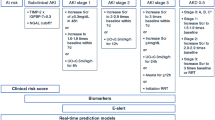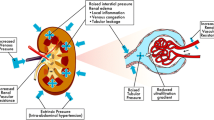Abstract
Objectives
To validate the recently proposed criteria for acute renal injury (ARI), acute renal failure syndrome (ARFS) and severe acute renal failure syndrome (SARFS) and to evaluate the significance of other prognostic factors.
Design and setting
Retrospective analysis of the Riyadh ICU Program database of patients admitted to 22 ICUs in UK and Germany between 1989 and 1998.
Patients
Included in the study were 41,972 patients, of whom 7,522 (17.9%) had ARI, 2,641 (6.3%) had ARFS and 1,747 (4.2%) had SARFS.
Results
Patients with ARI, ARFS or SARFS had a hospital mortality of 29.5%, 49.2% or 63.0%, respectively, compared to 10.3% among patients without acute renal failure. In the presence of contemporaneous failure of any other organs on the day of acute renal failure, hospital mortality increased to 73.3%, 76.2%, 72.1% and 18%, respectively. Multivariate analysis showed that non-surgical admission, need for emergency surgery, development of acute renal failure during stay in ICU, need for mechanical ventilation and the number of other failed organ systems had a greater impact on prognosis than the need for renal replacement therapy.
Conclusions
The proposed criteria for ARI, ARFS and SARFS correlated with mortality, but other factors had a greater impact on prognosis. Renal replacement therapy did not increase the risk of hospital mortality among patients with acute renal failure.
Similar content being viewed by others
References
Nair P, Bihari D (1997) Acute renal failure in the ICU in the 1990 s—”anything goes”? Intensive Care Med 23:1193–1196
Cosentino F, Chaff C, Piedmonte M (1994) Risk factors influencing survival in ICU acute renal failure. Nephrol Dial Transplant 9 (Suppl 4):179–182
Kellum JA, Angus DC (2002) Patients are dying of acute renal failure. Crit Care Med 30:2156–2157
Breen D, Bihari D (1998) Acute renal failure as a part of multiple organ failure: the slippery slope of critical illness. Kidney Int 53 (Suppl 66):S25–S33
Novis BK, Roizen MF, Aronson S, Thisted RA (1994) Association of preoperative risk factors with postoperative acute renal failure. Anesth Analg 78:143–149
Bellomo R, Kellum J, Ronco C (2001) Acute renal failure: time for consensus. Intensive Care Med 27:1685–1688
Knaus WA, Draper EA, Wagner DP, Zimmermann JE (1985) Prognosis in acute organ-system failure. Ann Surg 202:685–693
Chang RWS, Jacobs S, Lee B (1987) Gastrointestinal dysfunction among intensive care unit patients. Crit Care Med 15:909–914
Knaus WA, Draper EA, Wagner DP, Zimmermann JE (1985) APACHE II: a severity of disease classification system. Crit Care Med 13:818–829
Neveu H, Kleinknecht D, Brivet F, Loirat P, Landais P and The French Study Group on Acute Renal Failure (1996) Prognostic factors in acute renal failure due to sepsis. Results of a prospective multicentre study. Nephrol Dial Transplant 11:293–299
Brivet FG, Kleinknecht DJ, Loirat P, Landais PJM, The French Study Group on Acute Renal Failure (1996) Acute renal failure in intensive care units—causes, outcome and prognostic factors of hospital mortality: a prospective, multicenter study. Crit Care Med 24:192–198
Liano F, Junco E, Pascual J, Madero R, Verde E, and the Madrid Acute Renal Failure Study Group (1998) The spectrum of acute renal failure in the intensive care unit compared with that seen in other settings. Kidney Int 53:S16–S24
Chertow GM, Christiansen CL, Cleary PD, Munro C, Lazarus M (1995) Prognostic stratification in critically ill patients with acute renal failure requiring dialysis. Arch Intern Med 155:1505–1511
Mehta RL, Pascual MT, Soroko S, Savage BR, Himmelfarb J, Ikizler TA, Paganini EP, Chertow GM, for the Program to Improve Care in Acute Renal Disease (PICARD) (2004) Spectrum of acute renal failure in the intensive care unit: the PICARD experience. Kidney Int 66(4):1613–1621
Groeneveld ABJ, Tran DD, Van der Meulen J, Nauta JJP, Thijs LG (1991) Acute renal failure in the medical intensive care unit: predisposing, complicating factors and outcome. Nephron 59:602–610
Vivino G, Antonelli M, Moro ML, Cottini F, Conti G, Bufi M, Cannata F, Gasparetto A (1998) Risk factors for acute renal failure in trauma patients. Intensive Care Med 24:808–814
Metnitz PGH, Krenn CG, Steltzer H, Lang T, Ploder J, Lenz K, Le Gall JR, Druml W (2002) Effect of acute renal failure requiring renal replacement therapy on outcome in critically ill patients. Crit Care Med 30:2051–2058
Druml W (1996) Prognosis of acute renal failure 1975–1995. Nephron 73:8–15
Bernieh B, Al Hakim M, Boobes Y, Siemkovics E, El Jack H (2004) Outcome and predictive factors of acute renal failure in the intensive care unit. Transplant Proc 36(6):1748–1747
Levy EM, Viscoli CM, Horwitz RI (1996) The effect of acute renal failure on mortality—a cohort analysis. JAMA 275:1489–1494
Druml W (1999) Metabolic aspects of continuous renal replacement therapies. Kidney Int 56 (Suppl 72): S56–S61
Schetz M (1999) Non-renal indications for continuous renal replacement therapy. Kidney Int 56 (Suppl 72): S88–S94
Kellum JA, Angus DC, Johnson JP, Leblanc M, Griffin M, Ramakrishnan N, Linde-Zwirble WT (2002) Continuous versus intermittent renal replacement therapy: a meta-analysis. Intensive Care Med 28:29–37
Tonelli M, Manns B, Feller-Kopman D (2002) Acute renal failure in the intensive care unit: a systematic review of the impact of dialytic modality on mortality and renal recovery. Am J Kidney Dis 40:875–885
Acknowledgement
We wish to thank the Riyadh ICU Program Users Group for access to the data used in this study.
Author information
Authors and Affiliations
Consortia
Corresponding author
Rights and permissions
About this article
Cite this article
Ostermann, M.E., Chang, R.W.S. & for the Riyadh ICU Program Users Group. Prognosis of acute renal failure: an evaluation of proposed consensus criteria. Intensive Care Med 31, 250–256 (2005). https://doi.org/10.1007/s00134-004-2523-y
Accepted:
Published:
Issue Date:
DOI: https://doi.org/10.1007/s00134-004-2523-y




